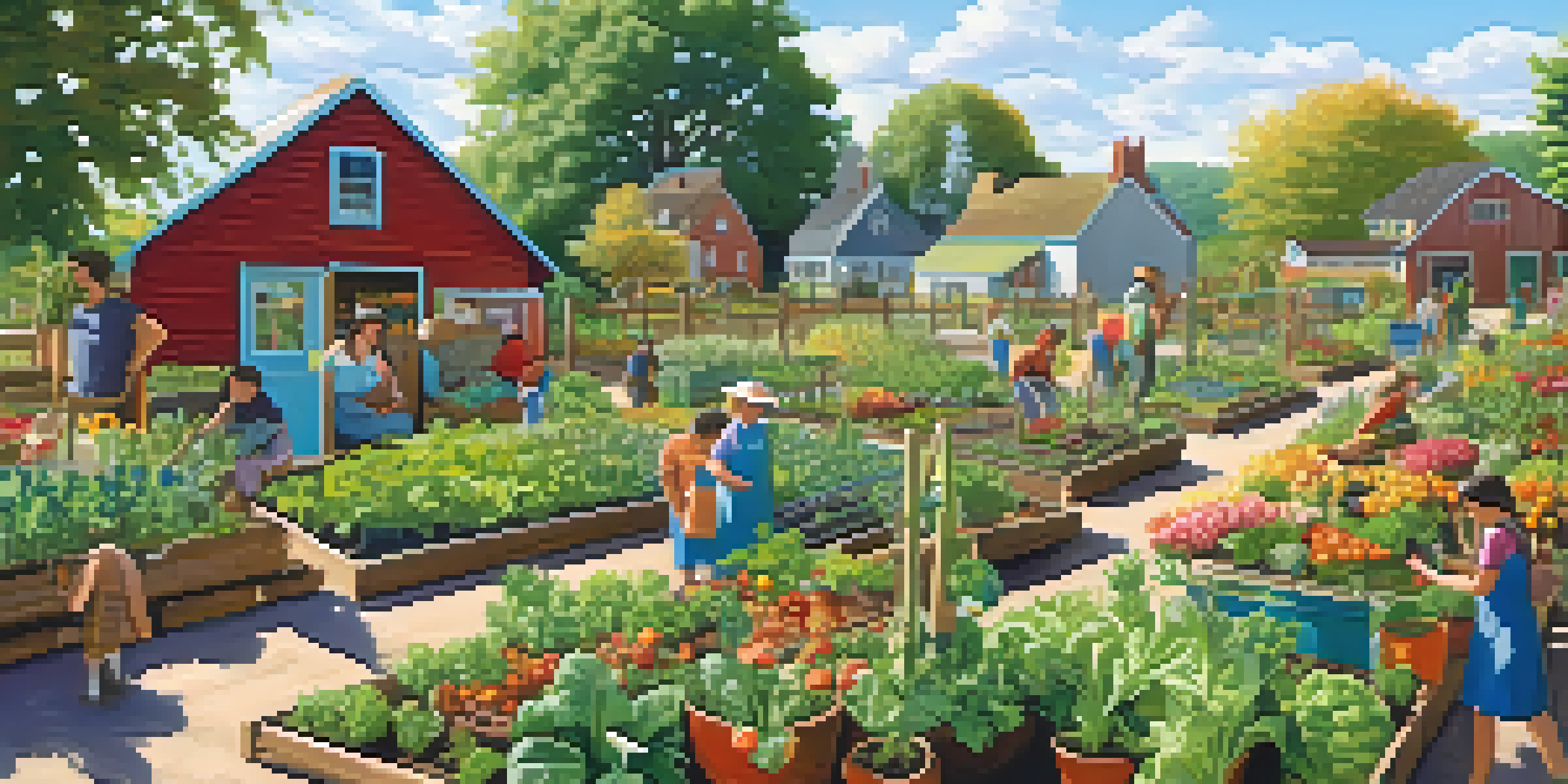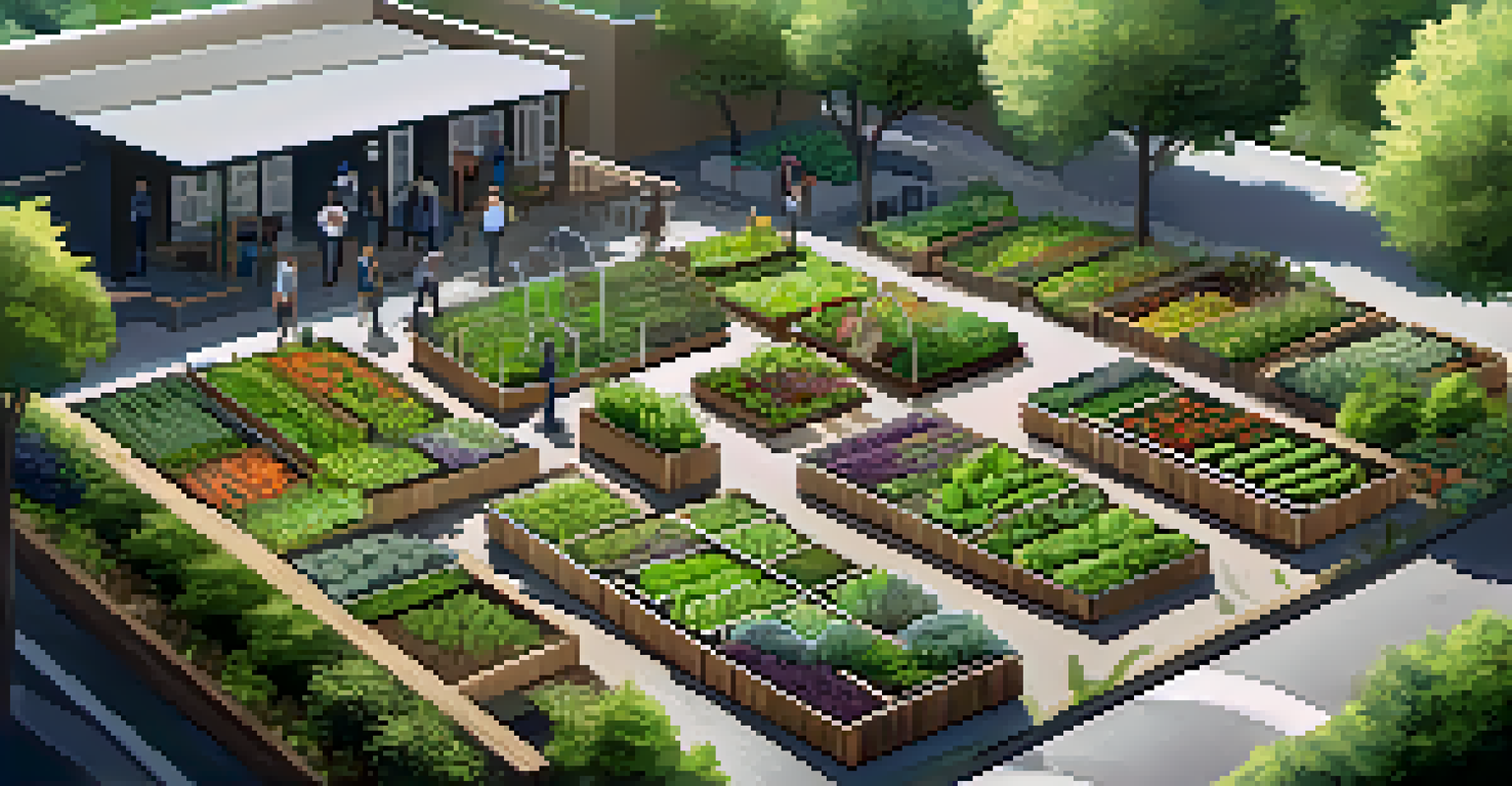The Benefits of Community Gardens for Holistic Nutrition

Understanding Holistic Nutrition and Its Importance
Holistic nutrition focuses on the whole person, emphasizing the connection between food, body, and mind. It's not just about what we eat, but how it impacts our overall well-being. This approach encourages us to consider the nutritional value of our food, but also its source and its effects on our health and environment.
Eating is an agricultural act.
Community gardens play a pivotal role in holistic nutrition by providing fresh produce that is often more nutritious than store-bought options. When we grow our own food, we gain a deeper appreciation for what we consume, fostering a healthier relationship with our meals. This connection can lead to better food choices and a heightened awareness of nutritional needs.
Moreover, holistic nutrition encourages using seasonal and local foods, which community gardens excel at supplying. By harvesting what’s in season, we not only enjoy fruits and vegetables at their peak flavor and nutrient density, but we also reduce our carbon footprint. This thoughtful approach to eating promotes sustainable practices and enhances our overall health.
Building Community Connections Through Gardening
Community gardens are more than just patches of green; they are spaces where individuals come together to cultivate not only plants but also friendships. These shared spaces foster a sense of belonging and unity among participants, creating bonds that often extend beyond the garden itself. Engaging in gardening activities with neighbors can transform a community into a supportive network.

As people collaborate on planting and harvesting, they share knowledge, skills, and experiences, enriching each other’s lives. This communal effort not only enhances the gardening experience but also encourages social interaction, making it an excellent avenue for personal growth and connection. The stories shared and friendships formed in these gardens can lead to a stronger, more resilient community.
Holistic Nutrition Enhances Well-Being
Holistic nutrition emphasizes the importance of connecting food choices with overall health, mental wellness, and environmental impact.
Additionally, these interactions often inspire community members to explore healthy eating habits and cooking practices. As participants exchange recipes and tips on using their home-grown produce, they cultivate a culture of health and wellness. This ripple effect can lead to improved dietary choices throughout the community, promoting holistic nutrition for all.
Promoting Mental Well-Being Through Gardening
Gardening has been shown to have significant mental health benefits, acting as a natural stress reliever. Spending time in a garden allows individuals to escape the hustle and bustle of daily life, promoting mindfulness and relaxation. The act of nurturing plants can be therapeutic, offering a sense of purpose and accomplishment as we watch our efforts bloom.
The greatest gift of the garden is the restoration of the five senses.
Engaging with nature has proven effects on mood enhancement and reducing anxiety. The sensory experiences of gardening—the feel of soil, the sight of vibrant flowers, and the sounds of nature—can elevate our spirits and ground us in the present moment. By immersing ourselves in these experiences, we can foster emotional resilience.
For many, community gardens provide a safe haven where they can connect with nature and others. This shared space becomes a sanctuary where people can express themselves, share their fears, and celebrate their successes. Ultimately, these gardens can play a vital role in nurturing not just our bodies, but also our minds.
Encouraging Physical Activity and Healthy Habits
Participating in community gardening is a fantastic way to incorporate physical activity into our daily lives. From digging and planting to weeding and harvesting, gardening engages various muscle groups and promotes overall fitness. This form of exercise can be enjoyable and rewarding, making it easier to stay active.
Moreover, working in a garden encourages the development of healthy habits, as the physical labor often leads to improved stamina and strength. Regular activity can help combat sedentary lifestyles, particularly in urban areas where open spaces may be limited. As community members come together, they motivate each other to stay active and engaged.
Community Gardens Foster Connection
Community gardens promote social interaction and community bonding, encouraging healthier eating habits and a sense of belonging among participants.
The physical benefits of gardening naturally lead to improved health outcomes, including weight management and increased energy levels. When combined with the nutrition gained from fresh produce, the cycle of healthy living becomes self-reinforcing. Gardening not only cultivates plants but also fosters a culture of well-being within the community.
Fostering Environmental Awareness and Sustainability
Community gardens serve as living laboratories for environmental education. Participants learn about sustainable gardening practices, such as composting, crop rotation, and organic pest control. This hands-on experience cultivates a greater awareness of environmental issues and the importance of sustainable food systems.
By growing food in a community setting, individuals can see the impact of their choices on the environment. They learn to appreciate the value of local ecosystems and the benefits of reducing food miles. This consciousness often extends beyond the garden, inspiring participants to adopt more sustainable practices in their own lives.
Furthermore, community gardens contribute to urban biodiversity by providing habitats for various species. This promotes a healthier ecosystem and encourages participants to respect the natural world around them. The connection between holistic nutrition and environmental stewardship becomes clear, as both aim to nurture our planet and ourselves.
Enhancing Food Security in Local Communities
Community gardens play a crucial role in addressing food insecurity, particularly in urban areas where access to fresh produce may be limited. By creating a shared space for growing food, these gardens provide a vital resource for families in need. They empower community members to take control of their food sources and promote self-sufficiency.
In addition to providing fresh fruits and vegetables, community gardens often host educational workshops on nutrition and cooking. This knowledge equips individuals with the skills to make healthier food choices, ultimately enhancing their overall diet. As participants learn to prepare meals with their home-grown produce, they develop a greater appreciation for nutritious eating.
Gardening Supports Sustainable Practices
Engaging in community gardening cultivates environmental awareness, promotes sustainability, and enhances food security within local communities.
Moreover, community gardens often donate surplus produce to local food banks or shelters, further extending their impact. This collaborative effort not only helps those in need but also strengthens community ties. By working together to support one another, community gardens become a powerful tool for fostering food security and holistic nutrition.
Creating Lifelong Learning Opportunities in Gardens
Community gardens are excellent platforms for lifelong learning, offering opportunities for individuals of all ages to gain new skills. Whether it’s learning about seed saving, organic gardening techniques, or cooking with seasonal ingredients, these gardens serve as educational hubs. Participants often share their knowledge, creating a rich tapestry of learning experiences.
Workshops and events held in community gardens can further enhance this learning experience. Topics can range from composting to nutrition education, allowing community members to dive deeper into aspects of holistic nutrition and sustainable practices. This collaborative environment encourages curiosity and fosters a culture of continuous improvement.

Ultimately, the knowledge gained in community gardens can be applied beyond the garden itself. Individuals can take these skills home, influencing their dietary choices and encouraging healthier lifestyles within their families. This ripple effect cultivates a community that values education, health, and nutrition for generations to come.